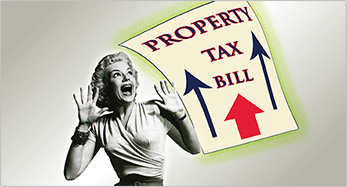
Since 1978, Proposition 13 has required the approval of two-thirds of voters for any special tax, but Sacramento politicians and now the courts are undermining this important taxpayer protection.
The assault on the two-thirds vote requirement for special taxes — taxes earmarked for a specific purpose — is once again before the Legislature in the form of Assembly Constitutional Amendment 1. This measure, which failed in the last legislative session, has been reintroduced for the 2021–22 session. ACA 1 would lower the vote needed to pass taxes and bonds from two-thirds down to just 55 percent if the money is to be used for affordable housing, homeless housing or “infrastructure.”
If enacted, ACA 1 would allow local governments to put new taxes and bond debt on the ballot for nearly any purpose, and those measures would pass with 55 percent of the vote instead of requiring the approval of two-thirds of voters. By making it easier to pass tax increases and local bonds, ACA 1 would almost guarantee that property tax bills would rise after nearly every election.
An even greater threat to the two-thirds protection is coming from the state courts. In 2017, the California Supreme Court issued a ruling in a case known as California Cannabis Coalition v. City of Upland. The opinion seemed to suggest that special taxes may not need a two-thirds vote if they are proposed by the voters themselves through the initiative process.
It didn’t take long for local governments and special-interest groups to put this idea to the test. In 2018, several special tax proposals proposed by citizens’ initiatives made it to the ballot, including one that was actually proposed by the San Francisco Board of Supervisors, disguised as an initiative when one supervisor volunteered to act as the “citizen proponent” of the measure.
That measure was Proposition C, a gross receipts tax on commercial rents. It received barely over 50 percent of the vote, but the board of supervisors declared that because it was an “initiative,” it needed only a simple majority, not two-thirds, of the vote. The board declared that the measure passed.
HJTA challenged this declared outcome in court, joined by other organizations. HJTA also got involved in a case in Fresno over another special tax that failed to reach the two-thirds vote threshold. Other groups have sued to challenge more special tax initiatives in San Francisco, Oakland and Alameda County.
Some of these cases have reached the court of appeal, and the rulings there have, so far, gone against taxpayers.
HJTA is continuing the fight and hopes the state Supreme Court will review one or more of these cases and declare that special taxes need a two-thirds vote to pass, no matter how they’re proposed.
HJTA is also committed to defeating ACA 1 in the State Legislature, where it needs a two-thirds vote in each house in order to get on the ballot. Once on the ballot, it would need only a simple majority to pass.
If lawmakers and judges continue to open loopholes in Proposition 13, the Howard Jarvis Taxpayers Association is prepared to work with like-minded groups to close them again. California’s taxes are already far too high.
HJTA.org is your source for everything Proposition 13 and for information valuable to California taxpayers. For more information or to take action, go to HJTA.org/take-action.
Published by the Howard Jarvis Taxpayers Association (HJTA). Copyright © 2021 by Howard Jarvis Taxpayers Association. All rights reserved.

